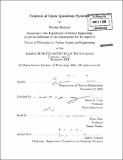Control of open quantum systems
Author(s)
Boulant, Nicolas
DownloadFull printable version (6.997Mb)
Other Contributors
Massachusetts Institute of Technology. Dept. of Nuclear Engineering.
Advisor
David G. Cory.
Terms of use
Metadata
Show full item recordAbstract
This thesis describes the development, investigation and experimental implementation via liquid state nuclear magnetic resonance techniques of new methods for controlling open quantum systems. First, methods that improve coherent control through the use of both strong control fields and detailed knowledge of the subsystem's Hamiltonian are demonstrated. With the aid of numerical search methods, pulsed irradiation schemes are obtained that perform accurate, arbitrary, selective gates on multi-qubit systems. For systems of 3 and 4 qubits, simulations show that the control sequences faithfully implement unitary operations with gate fidelities on the order of 0.999 while experimentally determined correlations of 0.99 were obtained. The technique is then extended to account for the incoherent errors arising from the slow variation of control parameters. It is demonstrated in this study that such errors can be greatly counteracted directly from the design of the time-dependent control fields if some knowledge about the incoherence source is available. The results obtained show a substantial decrease of the non-unitary features normally caused by incoherent noise. The methods are applicable to a variety of experimental studies in quantum information processing. (cont.) To test the control techniques, we carried out two benchmark experiments, namely an entanglement transfer and an entanglement swapping experiment performed on a 4-qubit system. The second experiment, while more complex, yields significantly better results, thereby showing the improvement made by the further development of the control techniques. To optimally protect a quantum system against various decoherent errors, it is essential to design methods to acquire knowledge about them. It is in this context that we then develop a robust method for quantum process tomography for measuring relaxation superoperators and Lindblad operators, which is experimentally tested. Finally, we explore both theoretically and experimentally the concatenation of a quantum error correction code with a decoherence-free subspace scheme. Using the two techniques, a 4-qubit quantum system is efficiently protected against a noise containing partial symmetry. To date, this is the first experimental demonstration of such a concatenation scheme.
Description
Thesis (Ph. D.)--Massachusetts Institute of Technology, Dept. of Nuclear Engineering, February 2005. Includes bibliographical references (p. 93-102).
Date issued
2005Department
Massachusetts Institute of Technology. Department of Nuclear Engineering; Massachusetts Institute of Technology. Department of Nuclear Science and EngineeringPublisher
Massachusetts Institute of Technology
Keywords
Nuclear Engineering.